101 start with T start with T
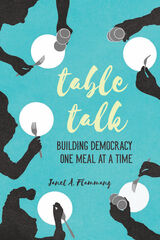
The civic virtues of a seat at the table
Etiquette books insist that we never discuss politics during a meal. In Table Talk, Janet A. Flammang offers a polite rebuttal, presenting vivid firsthand accounts of people's lives at the table to show how mealtimes can teach us the conversational give-and-take foundational to democracy. Delving into the ground rules about listening, sharing, and respect that we obey when we break bread, Flammang shows how conversations and table activities represent occasions for developing our civil selves. If there are cultural differences over practices--who should speak, what behavior is acceptable, what topics are off limits, how to resolve conflict--our exposure to the making, enforcement, and breaking of these rules offers a daily dose of political awareness and growth. Political table talk provides a forum to practice the conversational skills upon which civil society depends. It also ignites the feelings of respect, trust, and empathy that undergird the idea of a common good that is fundamental to the democratic process.
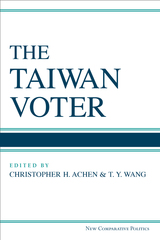
Taiwan’s electoral politics draws international scholarly interest because of the prominent role of ethnic and national identification. While in most countries the many tangled strands of competing identities are daunting for scholarly analysis, in Taiwan the cleavages are powerful and limited in number, so the logic of interrelationships among issues, partisanship, and identity are particularly clear. The Taiwan Voter unites experts to investigate the ways in which social identities, policy views, and partisan preferences intersect and influence each other. These novel findings have wide applicability to other countries, and will be of interest to a broad range of social scientists interested in identity politics.

As elected lawmakers confront complex social problems, they inevitably make choices to single out certain populations for government-sanctioned benefits or burdens. Why some groups and not others are targeted is the central question explored in this analysis of the congressional response to two related public health crises.
Weaving case studies from the wars against AIDS and drugs with an empirical analysis of fifteen years of congressional action on these issues, Mark Donovan shows how members of Congress balance problem solving with re-election concerns, paying particular attention to their need to craft compelling rationales for their actions. His analysis shows that, counterintuitive as it may seem, most target populations with negative public images are selected to receive benefits rather than burdens.
Demonstrating that it is possible to analyze simultaneously both policy rhetoric and policy outputs, this book shows how problem frames and policy decisions evolve through the dynamic interplay of conflict participants.
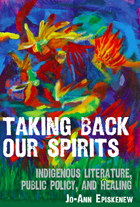

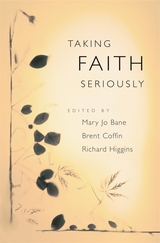
Whether simply uneasy or downright hostile, the relation between religion and liberal democracy in this country has long been vexed and complex--and crucial to what America is and aspires to be. Amid increasingly contentious exchanges over fundamentalism, abortion rights, secularism, and pluralism, this book reminds us of the critical role that religion plays in the health and well-being of a democracy.
A healthy democracy draws strength from a rich civic and social life, many forms of which are religious. Moreover, these contributions are anchored in the intrinsic commitments of faith, commitments that extend over time, linking generations past and present. Strengthening these commitments and practices, the authors suggest, will also fortify pluralistic civil society and democratic participation. Their book provides the analytical tools and historical perspective for building and reinforcing such a constructive engagement between religion and liberal democracy--and for understanding the ongoing dialogue between secular political philosophy and communities of faith.
Taking Faith Seriously offers nine case studies that describe the multiple and subtle roles that religion plays on many levels in our civic life: increasing moral and social "capital," inspiring citizens to serve their neighbors, building relationships across barriers of race and income, and providing a moral vision of what kind of society we are called to be.
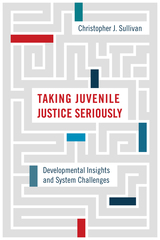
The juvenile justice system navigates a high degree of variation in youthful offenders. While professionals with insights about reform and adolescent development consider the risks, the needs, and the patterns of delinquency of youth, too little attention is paid to the responses and practicalities of a system that is both complex and limited in its resources.
In his essential book, Taking Juvenile Justice Seriously, Christopher Sullivan systematically analyzes key facets of justice-involved youth populations and parses cases to better understand core developmental influences that affect delinquency. He takes a comprehensive look at aspects of the life-course affected by juvenile justice as well as at the juvenile justice system’s operations and its multifaceted mission of delivering both treatment and sanctions to a varied population of youths.
Taking Juvenile Justice Seriously first provides an overview of the youth who encounter the system, then describes its present operations and obstacles, synthesizes relevant developmental insights, and reviews current practices. Drawing on research, theory, and evidence regarding innovative policies, Sullivan offers a series of well-grounded recommendations that suggest how to potentially—and realistically—implement a more effective juvenile justice system that would benefit all.

Taking the Initiative shows that majority party leaders in Congress have set and successfully pushed their own policy agendas for decades—revealing the 'Contract With America' as only the most recent, and certainly not the most successful, example of independent policy making.
Cutting deeply into the politics and personalities of three decades of party leadership, John B. Bader probes the strategies and evaluates the effectiveness of House and Senate leaders operating in a divided government, when Congress and the presidency are controlled by different political parties. He provides a historical context for analyzing the"Contract" and shows that aggressive agenda-setting has long been a regular feature of majority party leadership.
Bader interviewed more than seventy congressional leaders, staff members, party officials, and political consultants, including speakers Thomas "Tip" O'Neill and Jim Wright, for this book. He supplemented these interviews with research in largely unexplored archival materials such as press conference transcripts, notes from White House leadership meetings, and staff memoranda on strategy.
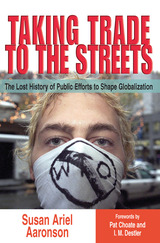
The book explores how trade agreement critics built a fluid global movement to redefine the terms of trade agreements (the international system of rules governing trade) and to redefine how citizens talk about trade. (The "terms of trade" is a relationship between the prices of exports and of imports.) That movement, which has been growing since the 1980s, transcends borders as well as longstanding views about the role of government in the economy. While many trade agreement critics on the left say they want government policies to make markets more equitable, they find themselves allied with activists on the right who want to reduce the role of government in the economy.
Aaronson highlights three hot-button social issues--food safety, the environment, and labor standards--to illustrate how conflicts arise between trade and other types of regulation. And finally she calls for a careful evaluation of the terms of trade from which an honest debate over regulating the global economy might emerge.
Ultimately, this book links the history of trade policy to the history of social regulation. It is a social, political, and economic history that will be of interest to policymakers and students of history, economics, political science, government, trade, sociology, and international affairs.
Susan Ariel Aaronson is Senior Fellow at the National Policy Institute and occasional commentator on National Public Radio's "Morning Edition."
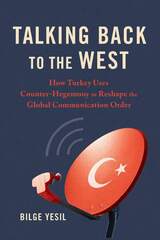
Insightfully exploring the crossroads of communications and authoritarianism, Talking Back to the West illuminates how the Erdogan government and its media allies use history, religion, and identity to pursue complementary agendas and tighten the AKP’s grip on power.

Honest, objective, and informed political debates are all too rare in today’s polarized and partisan climate. Public policy is increasingly driven by ideology while political spin, distortions, and even demonizing opponents by disseminating outright lies are routine practice from Washington to the local city council. Super-heated and hyper-partisan rhetoric, increasingly homogeneous political and ideological communities, and the public’s spotty knowledge about our political system all undermine informed and considered responses to policy debates.
This book identifies common areas of confusion or misunderstanding about our political system—clarifying many distortions of accepted history, constitutional law, economics, and science—to help readers distinguish documented facts from the different conclusions and interpretations that may be drawn from those facts. Sheila Suess Kennedy aims to create a more informed electorate and to better ground debates in fact, from Capitol Hill to the family dinner table. Talking Politics? What You Need to Know before Opening Your Mouth provides a solid starting point from which Americans can build more persuasive arguments for their preferred policies, whatever they may be, and will interest students of political science, civics, and history, from high school to undergraduates, and the general public interested in politics and informed discussion.
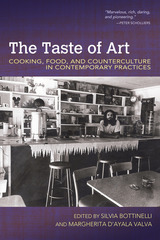
The Taste of Art offers a sample of scholarly essays that examine the role of food in Western contemporary art practices. The contributors are scholars from a range of disciplines, including art history, philosophy, film studies, and history. As a whole, the volume illustrates how artists engage with food as matter and process in order to explore alternative aesthetic strategies and indicate countercultural shifts in society.
The collection opens by exploring the theoretical intersections of art and food, food art’s historical root in Futurism, and the ways in which food carries gendered meaning in popular film. Subsequent sections analyze the ways in which artists challenge mainstream ideas through food in a variety of scenarios. Beginning from a focus on the body and subjectivity, the authors zoom out to look at the domestic sphere, and finally the public sphere.
Here are essays that study a range of artists including, among others, Filippo Tommaso Marinetti, Daniel Spoerri, Dieter Roth, Joseph Beuys, Al Ruppersberg, Alison Knowles, Martha Rosler, Robin Weltsch, Vicki Hodgetts, Paul McCarthy, Luciano Fabro, Carries Mae Weems, Peter Fischli and David Weiss, Janine Antoni, Elżbieta Jabłońska, Liza Lou, Tom Marioni, Rirkrit Tiravanija, Michael Rakowitz, and Natalie Jeremijenko.
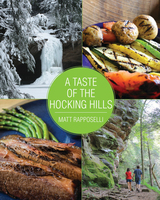
When chef Matt Rapposelli left the National Park Service to attend culinary school in New England, he was moving from one passion to another. What later brought those passions together was a job in the Hocking Hills, southeast Ohio’s stunning, wild landscape, where the restaurants he helmed—at Hocking Hills Lodge and Lake Hope Lodge—gained a resounding reputation for classic dishes that, driven by the regional vernacular and the natural seasonal abundance of Appalachia, were impeccably fresh and flavorful.
A Taste of the Hocking Hills intermingles delicious recipes with striking photographs of a region to which thousands trek each year. Rapposelli presents dishes by the season, noting the specialties that appear on his menus in a given time of year. Whether enjoying a winter evening or a summer morning, cooks will be able to bring a bit of the Hocking Hills home.
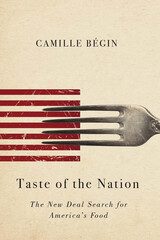
Camille Begin shapes a cultural and sensory history of New Deal-era eating from the FWP archives. From "ravioli, the diminutive derbies of pastries, the crowns stuffed with a well-seasoned paste" to barbeque seasoning that integrated "salt, black pepper, dried red chili powder, garlic, oregano, cumin seed, and cayenne pepper" while "tomatoes, green chili peppers, onions, and olive oil made up the sauce", Begin describes in mouth-watering detail how Americans tasted their food. They did so in ways that varied, and varied widely, depending on race, ethnicity, class, and region. Begin explores how likes and dislikes, cravings and disgust operated within local sensory economies that she culls from the FWP’s vivid descriptions, visual cues, culinary expectations, recipes and accounts of restaurant meals. She illustrates how nostalgia, prescriptive gender ideals, and racial stereotypes shaped how the FWP was able to frame regional food cultures as "American."
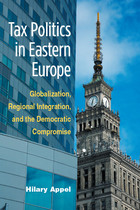
“This is the first book to systematically examine the variation in policies of Eastern European countries. There is a theoretical contribution to understandings of variation in tax policies, but just as impressive is the in-depth empirical analysis and in particular the data from interviews with key players in the process.”
—Yoshiko Herrera, University of Wisconsin-Madison
Post-Communist tax reform, like institutional reform in other areas of the post-Communist transition, holds tremendous material consequences for different groups in society. Consequently, one would expect the allocation of resources and the distribution of the financial burden of that allocation to be highly sensitive to domestic politics. Indeed the political stakes should be especially high since post-Communist tax reform requires not merely a simple adjustment at the margin, but the fundamental reallocation of the responsibility for government revenue. In Eastern Europe, however, important areas of tax policy do not reflect traditional domestic variables (e.g., interest groups and partisanship) so much as the international imperatives associated with regional and global economic integration.
In Tax Politics in Eastern Europe, Hilary Appel analyzes the domestic and international factors that drive tax policy. She begins with a review of the greatest challenges in the initial creation of the capitalist tax systems in former Communist states and then turns to the evolution of specific forms of taxation in order to gauge the relative impact of domestic politics on tax policy. Appel concludes that, although some tax areas, such as personal income taxes, remain politicized, most other taxes, such as corporate income taxes and all forms of consumption taxes, have been less subject to domestic political pressures because of powerful constraints resulting from regional and global economic integration.

Documenting the evolution of economic development and fiscal policies in Taiwan over the last four decades, this work explores the effectiveness of specific tax and trade policies. The authors make a major revision to the previously accepted role played by the export processing zones and the protection of domestic producers from foreign competition. The extensive use of duty exemption systems enabled the government to create competition among the exporting firms, and the innovative design of economic policies and administrative systems helped the private sector generate savings, expand investments, and promote exports.
This work analyzes how unique fiscal policies and administrative practices were designed to foster the rapid growth and development of Taiwan during this period.
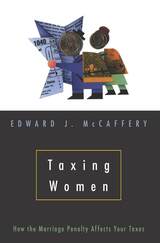
"Taxing Women is a must-have primer for any woman who wants to understand how our current tax system affects her family's economic condition. In plain English, McCaffery explains how the tax code stacks the deck against women and why it's in women's economic interest to lead the next great tax rebellion."—Patricia Schroeder
"McCaffery is an expert on the interplay between taxes and social policy. . . . Devastating in his analysis. . . . Intriguing."—Harris Collingwood, Working Women
"A wake-up call regarding the inequalities of an archaic system that actually penalizes women for working."—Publishers Weekly
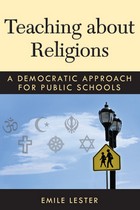
"This provocative and timely book challenges Americans to rethink what it means to take democracy and religious freedom seriously in public education. Emile Lester takes the reader beyond culture war conflicts rooted in religious divisions and offers bold, new solutions for addressing our differences with fairness and robust toleration. Instead of battlegrounds, he argues, public schools can and should be places that include all voices in ways that prepare citizens to engage one another with civility and respect. Teaching about Religions is essential reading for all who care about the future of public schools---and the health of American democracy."
--- Charles C. Haynes, Senior Scholar, Freedom Forum First Amendment Center
"More than simply a synthesis of existing scholarship, [this book is] an original contribution to the field. [The] major themes are timely, and this book might well contribute to public discussion of important issues in our culture wars."
---Warren Nord, University of North Carolina–Chapel Hill
"Arriving in the wake of a bitter battle over the place of Islam in America and in the midst of calls for greater understanding and civility, Emile Lester's new book is a timely contribution to the debate about the best ways to teach about religion in our nation's public schools. A pioneering researcher in this field, Lester offers thoughtful critiques of existing proposals as well as fresh ideas. His recommendations reflect painstaking efforts to understand the concerns of groups (most notably, conservative Christians) to which he does not belong, and a firm grasp of the difference between fostering understanding of other faiths and pressing for acceptance of them. Lester's prescriptions, always informed and fair-minded and sometimes provocative, should drive the debate forward in productive ways."
---Melissa Rogers, Director, Center for Religion and Public Affairs at Wake Forest University School of Divinity and Nonresident Senior Fellow, The Brookings Institution
Frequent news stories about the debates waged between secularists and religious conservatives have convinced most Americans that public schools must choose between promoting respect for religious minorities and respecting the interests of conservative Christians. As a result, public schools fail to teach students about the meaning and value of protecting religious liberty and consequently perpetuate mistrust across the cultural divide, further empower extremists, and obscure the fact that most Americans of all religious backgrounds share a commitment to basic democratic principles.
In response, the public schools in the religiously diverse and divided community of Modesto, California, have introduced a widely acclaimed required world religions course. Drawing on groundbreaking research on the creation of and response to the Modesto course as well as on political philosophy, Emile Lester advocates a civic approach to teaching about religion in public schools that at once emphasizes respect for all views about religion and provides a special recognition of conservative Christian beliefs.
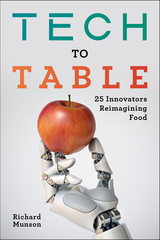
Tech to Table introduces readers to twenty-five of the most creative entrepreneurs advancing these solutions. They come from various places and professions, identities and backgrounds. But they share an outsider’s perspective and an idealistic, sometimes aggressive, ambition to rethink the food system.
Reinvention is desperately needed. Under Big Ag, pollution, climate change, animal cruelty, hunger, and obesity have festered, and despite decades of effort, organic farming accounts for less than one percent of US croplands. Entrepreneurs represent a new path, one where disruptive technology helps people and the environment. These innovations include supplements to lower the methane in cattle belches, drones that monitor irrigation levels in crops, urban warehouses that grow produce year-round, and more.
The pace and breadth of change is astonishing, as investors pump billions of dollars into ag-innovation. Startups are attracting capital and building markets, with the potential to upend conventional agribusiness’s stranglehold on the food system. Not every invention will prosper long-term, but each marks a fundamental change in our approach to feeding a growing population—sustainably.
A revolution in how we grow and eat food is brewing. Munson’s deftly crafted profiles offer a fascinating preview of the coming future of food.
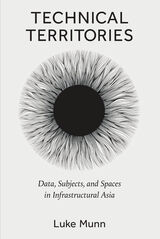
Territory is shifting. No longer defined by the dotted line of the border or the national footprint of soil, today’s territories are enacted through data infrastructures. From subsea cables to server halls, these infrastructures underpin new forms of governance, shaping subjects and their everyday lives. Technical Territories moves from masked protestors in Hong Kong to asylum-seekers in Christmas Island and sand miners in Singapore, exploring how these territories are both political and visceral, altering the experience of their inhabitants.
Infrastructures have now become geopolitical, strategic investments that advance national visions, extend influence, and trigger trade wars. Yet at the same time, these technologies also challenge sovereignty as a bounded container, enacting a more distributed and decoupled form of governance. Such “technical territories” construct new zones where subjects are assembled, rights are undermined, labor is coordinated, and capital is extracted. The stable line of the border is replaced by more fluid configurations of power. Luke Munn stages an interdisciplinary intervention over six chapters, drawing upon a wide range of literature from technical documents and activist accounts, and bringing insights from media studies, migration studies, political theory, and cultural and social studies to bear on these new sociotechnical conditions.
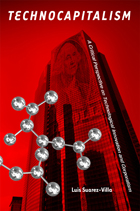
In his provocative book Technocapitalism, Luis Suarez-Villa addresses this phenomenon from the perspective of radical political economy and social criticism. Grounded in the premise that relations of power influence how human creativity and technology are exploited by the new corporatism, the author argues that new forms of democratic participation and resistance are needed, if the social pathologies created by this new version of capitalism are to be checked.
Considering the new sectors affected by technocapitalism, such as biotechnology, nanotechnology, bioinformatics, and genomics, Suarez-Villa deciphers the common threads of power and organization that drive their corporatization. These new sectors, and the corporate apparatus set up to extract profit and power through them, are imposing standards, creating business models, molding social governance, and influencing social relations at all levels. The new reality they create is likely to affect most every aspect of human existence, including work, health, life, and nature itself.
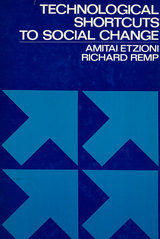
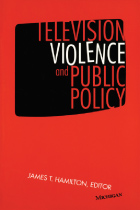
The essays in the volume provide answers to many of these questions on specific policy issues surrounding media violence. The contributors suggest that the research on television violence can serve as the basis for a framework that categorizes programs based on the context in which the violence is presented. The manner in which information is conveyed about violent content affects how viewers react to such warnings. Program warnings with MPAA-style ratings have the potential to confuse parents (since they do not provide detailed content information) and attract some viewers such as teenage males.
The contributors include some of the top researchers in the field of communications, several of whom participated in the National Television Violence Study. Contributors are Eva Blumenthal, Joanne Cantor, Wayne Danielson, Ed Donnerstein, Tim Gray, Kristen Harrison, Cynthia Hoffner, Marlies Klijn, Marina Krcmar, Dale Kunkel, Dominic Lasorsa, Rafael Lopez, Dan Linz, Adriana Olivarez, James Potter, Stacy Smith, Matthew L. Spitzer, Ellen Wartella, D. Charles Whitney, and Barbara Wilson.
This volume will be of interest to communications researchers, media policy experts, legal scholars, government and industry officials, and social scientists interested in media and television.
James Hamilton is Director of the Program on Violence and the Media, Duke University.

The essence of democracy is popular sovereignty. The people rule. In the United States, citizens exercise this right through elected officials who they believe will best represent their own values and interests. But are those interests and values always being followed? Authors Michael B. Berkman and Eric Plutzer provide the first systematic examination of the extent to which the governments closest to the American public—its 10,000-plus local school boards—respond to the wishes of the majority.
Ten Thousand Democracies begins with a look at educational reforms from the Progressive era in the late 19th and early 20th centuries through the civil rights movement and ending with Pennsylvania's 2004 tax relief measure. Berkman and Plutzer explore what factors determine education spending levels in school districts, including the effects of public opinion, the nature of local political institutions, and the roles played by special interests. The authors show how board members are selected, how well the boards represent minorities, whether the public can bypass the board through referenda, and how the schools are financed. By providing an innovative statistical portrait that combines public opinion data with Census data for these school districts, the authors answer questions central to democratic control of our schools: how responsive are school boards to their public and when? How powerful are such special interests such as teachers' unions and senior citizens? By using the lens of America's public school districts to examine the workings of democracy, Ten Thousand Democracies offers new insight not only into the forces shaping local education policy but also how democratic institutions may function throughout all levels of government.

“On the day that Archduke Franz Ferdinand, heir to the Austrian throne, was assassinated, Tennesseans worried about the weather,” Carole Bucy writes. Indeed, the war that began in Europe in 1914 was unimaginably remote from Tennessee—until it wasn’t.
Drawing on a depth of research into a wide array of topics, this vanguard collection of essays aims to conceptualize World War I through the lens of Tennessee. The book begins by situating life in Tennessee within the greater context of the war in Europe, recounting America’s growing involvement in the Great War. As the volume unfolds, editor Michael E. Birdwell and the contributors weave together soldier narratives, politics and agribusiness, African American history, and present-day recollections to paint a picture of Tennessee’s Great War experience that is both informative and gripping.
An essential addition to the broader historiography of the American experience during World War I, this collection of essays presents Tennessee stories that are close to home in more than just geography and lineage. By relating international conflict through the eyes of Tennessee’s own, editor Michael E. Birdwell and the contributing authors provide new opportunities for academics and general readers alike to engage with the Great War from a unique and—until now—untold perspective.

Boon or blight? Ann Bowman and Michael Pagano define "vacant land" broadly, to include everything from brownfields (environmentally contaminated land) through trashed lots and abandoned buildings to greenspace (parks, community gardens, etc.). Terra Incognita takes a fresh look at what they believe can be the ultimate urban resource. Beyond the common studies of the influence of market forces, it explores how these areas are affected by the decisions of local governments, and then shows how vacant land can be a valuable strategic asset for localities.
Terra Incognita derives from what—until now—has been the lack of substantial information about the amount and the diversity of urban vacant land. This book is based on an unprecedented survey sent to all U.S. towns with a population greater than 50,000, and contains data previously unavailable. Three cities were studied in greater depth for detailed case studies: the greater Phoenix and Seattle areas and Philadelphia-Camden. A number of other cities are cited frequently, including Boston, Chicago, Detroit, New York, Cleveland, Cincinnati, and Oklahoma City, among many others.
Identifying the fiscal, social, and development imperatives that drive the decisions local officials make about using vacant land, Bowman and Pagano pay particular attention to the varying dynamics of sales, property, and income taxes, and conclude with a model for making strategic decisions about land use based on a city's priorities.


Terrorism and Counterterrorism Studies examines the essence of terrorism as an instrument to achieve certain goals and explores our difficulties in defining the very concept itself. The volume also provides an overview of current (counter)terrorism studies and discusses policy implications. The resulting recommendations will be valuable for limiting terrorism’s impact and reducing the threat to global peace, security, and stability.


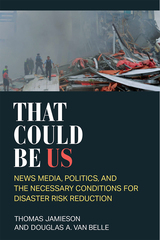
In That Could Be Us, Jamieson and Van Belle find that the news media delivers information to observing communities in a form that enables learning from other disasters. Experimental evidence shows that people react to this information in a way that would punish leaders who do not back DRR efforts. Case studies, interviews, experiments, and illustrative examples suggest that leaders and political entrepreneurs heed this public demand, react to news media coverage, and act accordingly. Taken as a whole, this suggests that the policy and research implications derived from this book’s theoretical model are worthy of further exploration, particularly in terms of how they might resolve the puzzle presented by the variations in DRR policy uptake around the world that do not seem to be driven by developmental differences across communities.
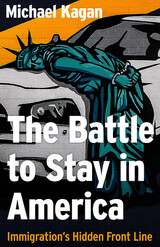
"Day-to-day life in immigrant communities is described with refreshing clarity and heart... an unusually accessible primer on immigration law and a valuable guide to the ways it currently works to perpetuate an excluded immigrant underclass with diminished rights."
—The New York Review of Books
The national debate over American immigration policy has obsessed politicians and disrupted the lives of millions of people for decades. The Battle to Stay in America focuses on Las Vegas, Nevada–a city where more than one in five residents was born in a foreign country, and where the community is struggling to defend itself against the federal government’s crackdown on undocumented immigrants. Told through the eyes of an immigration lawyer on the front lines of that battle, this book offers an accessible, intensely personal introduction to a broken legal system. It is also a raw, honest story of exhaustion, perseverance, and solidarity. Michael Kagan describes how current immigration law affects real people’s lives and introduces us to some remarkable individuals—immigrants and activists—who grapple with its complications every day. He explains how American immigration law often gives good people no recourse. He shows how under President Trump the complex bureaucracies that administer immigration law have been re-engineered to carry out a relentless but often invisible attack against people and families who are integral to American communities.
Kagan tells the stories of people desperate to escape unspeakable violence in their homeland, children separated from their families and trapped in a tangle of administrative regulations, and hardworking long-time residents suddenly ripped from their productive lives when they fall unwittingly into the clutches of the immigration enforcement system. He considers how the crackdown on immigrants negatively impacts the national economy and offers a deeply considered assessment of the future of immigration policy in the United States. Kagan also captures the psychological costs exacted by fear of deportation and by increasingly overt expressions of hatred against immigrants.
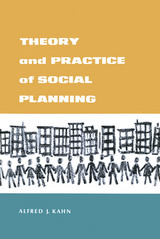

Even in the period following the electoral defeat of the Sandinista National Liberation Front (FSLN) in 1990, the revolution of 1979 continues to have a profound effect on the political economy of Nicaragua. Wright’s study, which is based on interviews with people from all walks of life—from government and party officials to academics and campesinos—as well as on the large volume of literature in both English and Spanish, focuses on the FSLN understanding of the relationships between the state, the party, and mass actors, and the nature of social classes. Wright considers the topics of agrarian reform, the development of mass organizations, the role of labor, and other aspects of the Nicaraguan political economy in order to assess their significance in theoretical as well as practical terms.
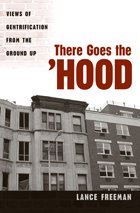
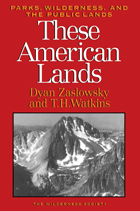
Over 634 million acres of the United States -- nearly a million square miles -- are federally owned. These American Lands is both a history and a celebration of that inheritance. First published in 1986, the book was hailed by Wallace Stegner as "the only indispensable narrative history of the public lands." This completely revised and updated edition is an unsurpassed resource for everyone who cares about, visits, or works with public land in the United States. With over 75 pages of new material, the volume covers:
- national parks
- national forests
- national resource lands
- wildlife refuges
- designated wildernesses
- wild and scenic rivers
- Alaska lands
- national trails
Each chapter outlines the history of the unit of public lands under discussion, clarifies the resource use and policy conflicts that are currently besetting it, and provides a detailed agenda of management, expansion, and preservation goals.
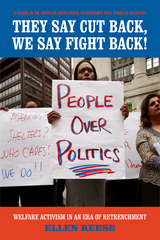
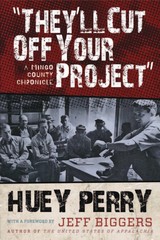
In old England, if a king didn’t like you, he would cut off your head. Now, if they don’t like you, they’ll cut off your project!
As the Johnson Administration initiated its war on poverty in the 1960s, the Mingo County Economic Opportunity Commission project was established in southern West Virginia. Huey Perry, a young, local history teacher was named the director of this program and soon he began to promote self-sufficiency among low-income and vulnerable populations. As the poor of Mingo County worked together to improve conditions, the local political infrastructure felt threatened by a shift in power. Bloody Mingo County, known for its violent labor movements, corrupt government, and the infamous Hatfield-McCoy rivalry, met Perry’s revolution with opposition and resistance.
In They’ll Cut Off Your Project, Huey Perry reveals his efforts to help the poor of an Appalachian community challenge a local regime. He describes this community’s attempts to improve school programs and conditions, establish cooperative grocery stores to bypass inflated prices, and expose electoral fraud. Along the way, Perry unfolds the local authority’s hostile backlash to such change and the extreme measures that led to an eventual investigation by the FBI. They’ll Cut Off Your Project chronicles the triumphs and failures of the war on poverty, illustrating why and how a local government that purports to work for the public’s welfare cuts off a project for social reform.


“The phrase ‘public intellectual’ is much bandied about. Just a few real heavyweights in the world merit the title, and Steven Weinberg is preeminent among them.”
—Richard Dawkins
“Weinberg has a knack for capturing a complex concept in a succinct, unforgettable image… One of the smartest and most diligent scientists around.”
—Nature
In this wise and wide-ranging meditation, one of the most captivating science communicators of our time challenges us to reconsider the entanglement of science and society. From the cosmological to the personal, from astronomy and quantum physics to the folly of manned spaceflight and the rewards of getting things wrong, Steven Weinberg shares his views on the workings of the universe and our aspirations and limitations. Third Thoughts aims to provoke and inform and never loses sight of the human dimension of scientific discovery.
“One of the 20th century’s greatest physicists…shares his strongly-held opinions on everything from the Higgs boson to the state of theoretical physics and the problems of science and society.”
—Forbes
“This book should be read not only for its insightful and illuminating explanations of a wide range of physical phenomena but also for the opportunity it affords to follow the wanderings of a brilliant mind through topics ranging from high-energy physics and the makeup of the cosmos to poetry, and from the history and philosophy of science to the dangers of economic inequality… [A] captivating book.”
—Mario Livio, Science
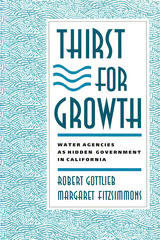
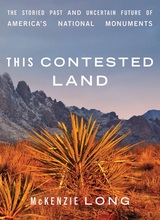
This land is your land. When it comes to national monuments, the sentiment could hardly be more fraught. Gold Butte in Nevada, Organ Mountains–Desert Peaks in New Mexico, Katahdin Woods and Waters in Maine, Cascade–Siskiyou in Oregon and California: these are among the thirteen natural sites McKenzie Long visits in This Contested Land, an eye-opening exploration of the stories these national monuments tell, the passions they stir, and the controversies surrounding them today.
Starting amid the fragrant sagebrush and red dirt of Bears Ears National Monument on the eve of the Trump Administration’s decision to reduce the site by 85 percent, Long climbs sandstone cliffs, is awed by Ancestral Pueblo cliff dwellings and is intrigued by 4,000-year-old petroglyphs. She hikes through remote pink canyons recently removed from the boundary of Grand Staircase–Escalante, skis to a backcountry hut in Maine to view a truly dark night sky, snorkels in warm Hawaiian waters to plumb the meaning of marine preserves, volunteers near the most contaminated nuclear site in the United States, and witnesses firsthand the diverse forms of devotion evoked by the Rio Grande. In essays both contemplative and resonant, This Contested Land confronts an unjust past and imagines a collaborative future that bears witness to these regions’ enduring Indigenous connections.
From hazardous climate change realities to volatile tensions between economic development and environmental conservation, practical and philosophical issues arise as Long seeks the complicated and often overlooked—or suppressed—stories of these incomparable places. Her journey, mindfully undertaken and movingly described, emphasizes in clear and urgent terms the unique significance of, and grave threats to, these contested lands.
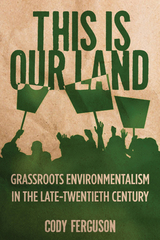
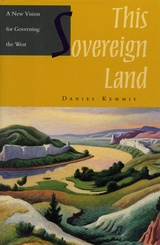
In the eight states of the interior West (Arizona, Colorado, Idaho, Montana, Nevada, New Mexico, Utah, and Wyoming), 260 million acres -- more than 48 percent of the land base -- are owned by the federal government and managed by its Washington, D.C.-based agencies. Like many other peoples throughout history who have bristled under the controlling hand of a remote government, westerners have long nursed a deep resentment toward our nation's capital. Rumblings of revolution have stirred for decades, bolstered in recent years by increasing evidence of the impossibility of a distant, centralized government successfully managing the West's widespread and far-flung lands.
In This Sovereign Land, Daniel Kemmis offers a radical new proposal for giving the West control over its land. Unlike those who wish to privatize the public lands and let market forces decide their fate, Kemmis, a leading western Democrat and committed environmentalist, argues for keeping the public lands public, but for shifting jurisdiction over them from nation to region. In place of the current centralized management, he offers a regional approach that takes into account natural topographical and ecological features, and brings together local residents with a vested interest in ensuring the sustainability of their communities. In effect, Kemmis carries to their logical conclusion the recommendations about how the West should be governed made by John Wesley Powell more than a century ago.
Throughout, Kemmis argues that the West no longer needs to be protected against itself by a paternalistic system and makes a compelling case that the time has come for the region to claim sovereignty over its own landscape. This Sovereign Land provides a provocative opening to a much-needed discussion about how democracy and ecological sustainability can go hand in hand, and will be essential reading for anyone interested in the West and western issues, as well as for all those concerned with place-based conservation, public lands management, bioregionalism, or related topics.
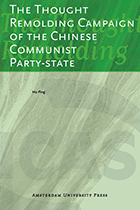
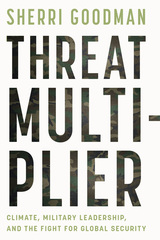
Indeed, for much of the twentieth century, the Department of Defense (DOD) was better known for containing the Soviet nuclear threat than protecting the environment. And yet, today, the military has moved from an environmental laggard to a clean energy and climate leader, recognizing that a warming world exacerbates every threat—from hurricanes and forest fires to terrorism and power plays by Russia and China. The Pentagon now considers climate in war games, disaster relief planning, international diplomacy, and even the design of its own bases.
What was the key to this dramatic change in military thinking? What keeps today’s generals and admirals up at night? How can we safeguard our national defense and our planet? No one is better poised to answer these questions than Sherri Goodman, who was at the vanguard of environmental leadership among our armed forces and civilian representatives. In Threat Multiplier, she tells the inside story of the military’s fight for global security, a tale that is as hopeful as it is harrowing.
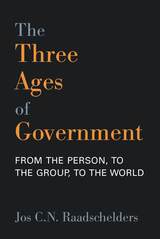
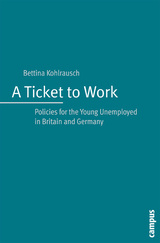
In A Ticket to Work, Bettina Kohlrausch examines the differing approaches taken by Britain and Germany to assisting young people with the often difficult transition from school to full-time work. Detailing the workings of such programs as skills training and job-placement assistance, the volume places those vocational training methods in the context of the general political and economic climate of the two nations, drawing a contrast between Britain’s more liberal market economy and Germany’s more structured and coordinated regime.
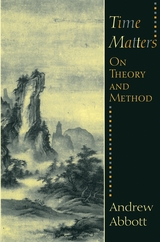
Time Matters focuses particularly on questions of time, events, and causality. Abbott grounds each essay in straightforward examinations of actual social scientific analyses. Throughout, he demonstrates the crucial assumptions we make about causes and events, about actors and interaction and about time and meaning every time we employ methods of social analysis, whether in academic disciplines, market research, public opinion polling, or even evaluation research. Turning current assumptions on their heads, Abbott not only outlines the theoretical orthodoxies of empirical social science, he sketches new alternatives, laying down foundations for a new body of social theory.
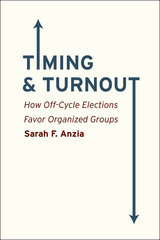
The low turnout for off-cycle elections, Anzia argues, increases the influence of organized interest groups like teachers’ unions and municipal workers. While such groups tend to vote at high rates regardless of when the election is held, the low turnout in off-cycle years enhances the effectiveness of their mobilization efforts and makes them a proportionately larger bloc. Throughout American history, the issue of election timing has been a contentious one. Anzia’s book traces efforts by interest groups and political parties to change the timing of elections to their advantage, resulting in the electoral structures we have today. Ultimately, what might seem at first glance to be mundane matters of scheduling are better understood as tactics designed to distribute political power, determining who has an advantage in the electoral process and who will control government at the municipal, county, and state levels.
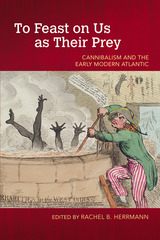
Winner, 2020 Association for the Study of Food and Society Book Award, Edited Volume
Long before the founding of the Jamestown, Virginia, colony and its Starving Time of 1609–1610—one of the most famous cannibalism narratives in North American colonial history—cannibalism played an important role in shaping the human relationship to food, hunger, and moral outrage. Why did colonial invaders go out of their way to accuse women of cannibalism? What challenges did Spaniards face in trying to explain Eucharist rites to Native peoples? What roles did preconceived notions about non-Europeans play in inflating accounts of cannibalism in Christopher Columbus’s reports as they moved through Italian merchant circles?
Asking questions such as these and exploring what it meant to accuse someone of eating people as well as how cannibalism rumors facilitated slavery and the rise of empires, To Feast on Us as Their Prey posits that it is impossible to separate histories of cannibalism from the role food and hunger have played in the colonization efforts that shaped our modern world.
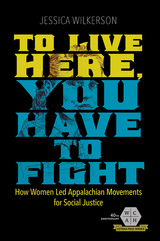
Jessica Wilkerson tells their stories within the larger drama of efforts to enact change in the 1960s and 1970s. She shows white Appalachian women acting as leaders and soldiers in a grassroots war on poverty--shaping and sustaining programs, engaging in ideological debates, offering fresh visions of democratic participation, and facing personal political struggles. Their insistence that caregiving was valuable labor clashed with entrenched attitudes and rising criticisms of welfare. Their persistence, meanwhile, brought them into unlikely coalitions with black women, disabled miners, and others to fight for causes that ranged from poor people's rights to community health to unionization.
Inspiring yet sobering, To Live Here, You Have to Fight reveals Appalachian women as the indomitable caregivers of a region--and overlooked actors in the movements that defined their time.
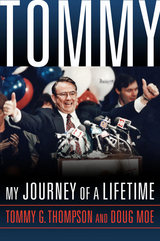
Personal and revealing stories punctuate the biographical details and policy discussions. Here is Tommy as a young man, just happening to be on the National Mall in 1964 when Dr. Martin Luther King told the nation "I have a dream." Here is Tommy as Wisconsin governor, struggling to start a Harley-Davidson motorcycle before leading "a pack of Hell's Republicans" on a ride through the state. Here is Tommy in Washington after the 9/11 attacks, slipping out of a secure bunker (in defiance of orders) to aid the emergency medical response.
Thompson speaks candidly of his achievements and regrets, including his involvement with welfare reform, school choice, land conservancy, prisons, the financing of Miller Park, stem cell research, and health insurance.

A new classic of science reporting.”—The New York Times
The true story of a small town ravaged by industrial pollution, Toms River won the 2014 Pulitzer Prize and has been hailed by The New York Times as "a new classic of science reporting." Now available in paperback with a new afterword by acclaimed author Dan Fagin, the book masterfully blends hard-hitting investigative journalism, scientific discovery, and unforgettable characters.
One of New Jersey’s seemingly innumerable quiet seaside towns, Toms River became the unlikely setting for a decades-long drama that culminated in 2001 with one of the largest environmental legal settlements in history. For years, large chemical companies had been using Toms River as their private dumping ground, burying tens of thousands of leaky drums in open pits and discharging billions of gallons of acid-laced wastewater into the town’s namesake river. The result was a notorious cluster of childhood cancers scientifically linked to local air and water pollution.
Fagin recounts the sixty-year saga of rampant pollution and inadequate oversight that made Toms River a cautionary tale. He brings to life the pioneering scientists and physicians who first identified pollutants as a cause of cancer and the everyday people in Toms River who struggled for justice: a young boy whose cherubic smile belied the fast-growing tumors that had decimated his body from birth; a nurse who fought to bring the alarming incidence of childhood cancers to the attention of authorities who didn’t want to listen; and a mother whose love for her stricken child transformed her into a tenacious advocate for change.
Rooted in a centuries-old scientific quest, Toms River is an epic of dumpers at midnight and deceptions in broad daylight, of corporate avarice and government neglect, and of a few brave individuals who refused to keep silent until the truth was exposed.
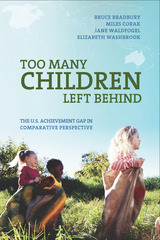
The belief that with hard work and determination, all children have the opportunity to succeed in life is a cherished part of the American Dream. Yet, increased inequality in America has made that dream more difficult for many to obtain. In Too Many Children Left Behind, an international team of social scientists assesses how social mobility varies in the United States compared with Australia, Canada, and the United Kingdom. Bruce Bradbury, Miles Corak, Jane Waldfogel, and Elizabeth Washbrook show that the academic achievement gap between disadvantaged American children and their more advantaged peers is far greater than in other wealthy countries, with serious consequences for their future life outcomes. With education the key to expanding opportunities for those born into low socioeconomic status families, Too Many Children Left Behind helps us better understand educational disparities and how to reduce them.
Analyzing data on 8,000 school children in the United States, the authors demonstrate that disadvantages that begin early in life have long lasting effects on academic performance. The social inequalities that children experience before they start school contribute to a large gap in test scores between low- and high-SES students later in life. Many children from low-SES backgrounds lack critical resources, including books, high-quality child care, and other goods and services that foster the stimulating environment necessary for cognitive development. The authors find that not only is a child’s academic success deeply tied to his or her family background, but that this class-based achievement gap does not narrow as the child proceeds through school.
The authors compare test score gaps from the United States with those from three other countries and find smaller achievement gaps and greater social mobility in all three, particularly in Canada. The wider availability of public resources for disadvantaged children in those countries facilitates the early child development that is fundamental for academic success. All three countries provide stronger social services than the United States, including universal health insurance, universal preschool, paid parental leave, and other supports. The authors conclude that the United States could narrow its achievement gap by adopting public policies that expand support for children in the form of tax credits, parenting programs, and pre-K.
With economic inequalities limiting the futures of millions of children, Too Many Children Left Behind is a timely study that uses global evidence to show how the United States can do more to level the playing field.
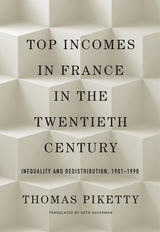
A landmark in contemporary social science, this pioneering work by Thomas Piketty explains the facts and dynamics of income inequality in France in the twentieth century. On its publication in French in 2001, it helped launch the international program led by Piketty and others to explore the grand patterns and causes of global inequality—research that has since transformed public debate. Appearing here in English for the first time, this stunning achievement will take its place alongside Capital in the Twenty-First Century as a modern classic of economic analysis.
Top Incomes in France in the Twentieth Century is essential in part because of Piketty’s unprecedented efforts to uncover, untangle, and present in clear form data about patterns in tax and inheritance in France dating back to 1900. But it is also an exceptional work of analysis, tracking and explaining with Piketty’s characteristically lucid prose the effects of political conflict, war, and social change on the economic pressures and public policies that determined the lives of millions. A work of unusual intellectual power and ambition, Top Incomes in France in the Twentieth Century is a vital resource for anyone concerned with the economic, political, and social history of France, and it is central to ongoing debates about social justice, inequality, taxation, and the evolution of capitalism around the world.
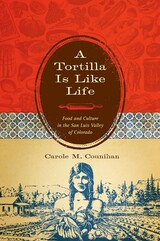
Located in the southern San Luis Valley of Colorado, the remote and relatively unknown town of Antonito is home to an overwhelmingly Hispanic population struggling not only to exist in an economically depressed and politically marginalized area, but also to preserve their culture and their lifeways. Between 1996 and 2006, anthropologist Carole Counihan collected food-centered life histories from nineteen Mexicanas—Hispanic American women—who had long-standing roots in the Upper Rio Grande region. The interviews in this groundbreaking study focused on southern Colorado Hispanic foodways—beliefs and behaviors surrounding food production, distribution, preparation, and consumption.
In this book, Counihan features extensive excerpts from these interviews to give voice to the women of Antonito and highlight their perspectives. Three lines of inquiry are framed: feminist ethnography, Latino cultural citizenship, and Chicano environmentalism. Counihan documents how Antonito's Mexicanas establish a sense of place and belonging through their knowledge of land and water and use this knowledge to sustain their families and communities. Women play an important role by gardening, canning, and drying vegetables; earning money to buy food; cooking; and feeding family, friends, and neighbors on ordinary and festive occasions. They use food to solder or break relationships and to express contrasting feelings of harmony and generosity, or enmity and envy. The interviews in this book reveal that these Mexicanas are resourceful providers whose food work contributes to cultural survival.
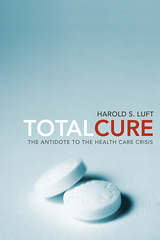
Proposals to reform the health care system typically focus on either increasing private insurance or expanding government-sponsored plans. Guaranteeing that everyone is insured, however, does not create a system with the quality of care patients want, the flexibility clinicians need, and the internal dynamics to continually improve the value of health care.
In Total Cure, Hal Luft presents a comprehensive new proposal, SecureChoice, which does all that while providing affordable health insurance for every American. SecureChoice is a plan that restructures payment for medical care, harnessing the flexibility and responsiveness of the market by aligning the incentives of clinicians, hospitals, and insurers with those of the patient. It uses the accountability of government to ensure transparency, competition, and equity.
SecureChoice has two major components. A universal pool covers the major risks of hospitalization and chronic illness, which account for almost two-thirds of all costs. Everyone would be in the pool, irrespective of employment, income, or health status. The second component emphasizes choice, flexibility, and responsibility. People will be able to choose any physician to serve as their “medical home,” to keep track of their health records, provide much of their care, and suggest referrals. Clinicians will have the information and incentives to continually enhance quality. SecureChoice also facilitates improvements in areas ranging from malpractice to pharmaceuticals and establishes new roles for key stakeholders such as health insurers.
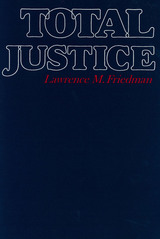
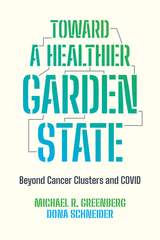
This book uses the past fifty years of New Jersey history as a case study to illustrate just how much public policy decisions and other upstream factors can affect the health of a state’s citizens. It reveals how economic and racial disparities in health care were exacerbated by bad policies regarding everything from zoning to education to environmental regulation. The study further chronicles how New Jersey struggled to deal with public health crises like the AIDS epidemic and the crack epidemic. Yet it also explores how the state has developed some of the nation’s most innovative responses to public health challenges, and then provides policy suggestions for how we might build an even healthier New Jersey.
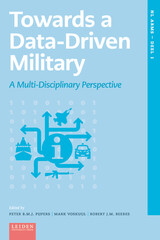

In order to ensure sustainable use of their shared marine resources, the nations of the West Caribbean Region must adopt an approach that encompasses both the human and natural dimensions of ecosystems. This volume directly contributes to that vision, bringing together the collective knowledge and experience of scholars and practitioners within the wider Caribbean to assemble a road map towards marine ecosystem based management for the region. The research presented here will be used not only as a training tool for graduate students, but also as comparative example and guide for stakeholders and policy makers in each of the world’s sixty-four large marine ecosystems.


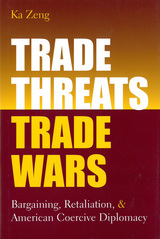
Ka Zeng finds answers to both of these questions in the domestic repercussions of the structure of trade between the United States and its trading partners, whether the United States has a competitive trade relationship with its trading partner, or whether trade is complementary.
This book offers practical policy prescriptions that promise to be of interest to trade policymakers and students of international trade policy.
Ka Zeng is Assistant Professor of Political Science at the University of Arkansas, Fayetteville.
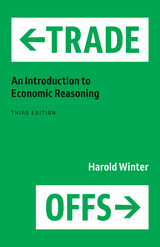
The highly engaging introduction to thinking like an economist, updated for a new generation of readers.
When economists wrestle with any social issue—be it unemployment, inflation, healthcare, or crime and punishment—they do so impersonally. The big question for them is: what are the costs and benefits, or trade-offs, of the solutions to such matters? These trade-offs constitute the core of how economists see the world—and make the policies that govern it.
Trade-Offs is an introduction to the economic approach of analyzing controversial policy issues. A useful introduction to the various factors that inform public opinion and policymaking, Trade-Offs is composed of case studies on topics drawn from across contemporary law and society.
Intellectually stimulating yet accessible and entertaining, Trade-Offs will be appreciated by students of economics, public policy, health administration, political science, and law, as well as by anyone following current social policy debates.

This is an auto-narrated audiobook edition of this book.
The highly engaging introduction to thinking like an economist, updated for a new generation of readers.
When economists wrestle with any social issue—be it unemployment, inflation, healthcare, or crime and punishment—they do so impersonally. The big question for them is: what are the costs and benefits, or trade-offs, of the solutions to such matters? These trade-offs constitute the core of how economists see the world—and make the policies that govern it.
Trade-Offs is an introduction to the economic approach of analyzing controversial policy issues. A useful introduction to the various factors that inform public opinion and policymaking, Trade-Offs is composed of case studies on topics drawn from across contemporary law and society.
Intellectually stimulating yet accessible and entertaining, Trade-Offs will be appreciated by students of economics, public policy, health administration, political science, and law, as well as by anyone following current social policy debates.
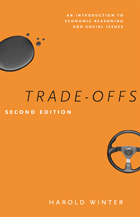
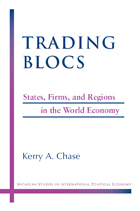
Trading Blocs is the first book to systematically demonstrate the theoretical significance of economies of scale in domestic pressure for trading blocs, and thereby build on a growing research agenda in areas of political economy and domestic politics.
"Chase has written a superb book that provides us with an innovative and compelling explanation for the development of trading blocs."
--Vinod Aggarwal, Director, Berkeley APEC Study Center, University of California, Berkeley
Kerry A. Chase is Assistant Professor of Political Science at Tufts University.
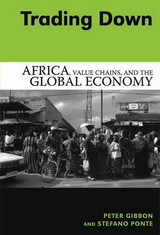
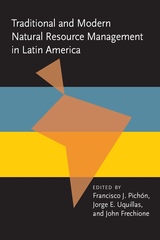
This book identifies a major problem facing developing nations and the countries and sources that fund them: the lack of attention and/or effective strategies available to prevent farmers in underdeveloped and poorly endowed regions from sinking still deeper into poverty while avoiding further degradation of marginal environments. The contributors propose an alliance of scientific knowledge with native skill as the best way to proceed, arguing that folk systems can often provide effective management solutions that are not only locally effective, but which may have the potential for spatial diffusion. While this has been said before, the volume makes one of the best articulated statements of how to implement such an approach.

Transatlantic Policymaking in an Age of Austerity integrates the study of politics and public policy across a broad spectrum of regulatory and social welfare policies in the United States and several nations of Western Europe. The editors and a sterling list of contributors look at policymaking in the 1990s through the present—providing a comparative politics framework—stressing both parallel development and the differences between and among the nations. Similar prevailing ideas and political factors can be identified and transatlantic comparisons made—providing for a clearer understanding of the policymaking process.
Faith in regulated markets and the burden of rising welfare costs are concerns found on both sides of the Atlantic. Western democracies also share political climates colored by economic austerity; low trust in government, pressures from interest groups, and a sharply divided electorate. Because of differing political processes and differing policy starting points, a variety of disparate policy decisions have resulted.
Real world policymaking in the areas of welfare, health, labor, immigration reform, disability rights, consumer and environmental regulation, administrative reforms, and corporate governance are compared. Ultimately, the last decade is best characterized as one of "drift," sluggish changes with little real innovation and much default to the private sector. In general, policymakers on both sides of the ocean, constrained by economic necessity, have been unable to produce policy outcomes that satisfy the key segments of the electorate.
The contributors examine the United States, Great Britain, France, and Germany, as well as a number of other European countries, and study the European Union itself as a policymaking institution. Transatlantic Policymaking in an Age of Austerity distills the prominent issues, politics, and roles played by governmental institutions into a new understanding of the dynamics of policymaking in and among transatlantic nations.
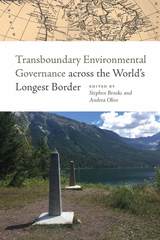

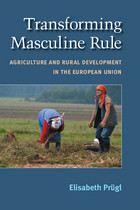
"The premise of mainstreaming gender is to bring equality concerns into every aspect of policy-making, and this brave book offers a close look at how feminists have taken up the challenge to transform the hidden dynamics of male domination in agricultural policy in Europe. In contrast to the automatic assumption that (neo)liberal policy always works against women’s interests, Prügl demonstrates the potential for feminist ju-jitsu to take advantage of multiple levels of governance to empower women in some circumstances. Although feminists were not always successful, the story of their efforts to remake agricultural policy should encourage activists to look for points of leverage in this and other contested and changing multilevel power systems."
---Myra Marx Ferree, University of Wisconsin
"Information on policy development, conflicts about improving the status of farm women, and using rural development policies to foster gender equality is hard to access in English and extremely useful for researchers concerned with the specifics of gender equality policy in the EU."
---Alison Woodward, Institute for European Studies, Vrije Universiteit Brussel
"This book is a must-read for scholars interested in the gendered process of global restructuring. Elisabeth Prügl succeeds superbly in teasing out the power politics involved in European agricultural policy. Through the lens of a feminist-constructivist approach, she makes visible the multiple mechanisms of gendered power within the state. This very lucid narrative is a milestone in a new generation of feminist theoretical scholarship."
---Brigitte Young, University of Muenster, Germany
Taking West and East Germany as case studies, Elisabeth Prügl shows how European agricultural policy has cemented long-standing gender-based inequalities and how feminists have used liberalization as an opportunity to challenge such inequalities. Through a comparison of the EU’s rural development program known as LEADER as it played out in the Altmark region in the German East and in the Danube/Bavarian Forest region in the West, Prügl provides a close-up view of the power politics involved in government policies and programs.
In identifying mechanisms of power (refusal, co-optation, compromise, normalization, and silencing of difference), Prügl illustrates how these mechanisms operate in arguments over gender relations within the state. Her feminist-constructivist approach to global restructuring as a gendered process brings into view multiple levels of governance and the variety of gender constructions operating in different societies. Ultimately, Prügl offers a new understanding of patriarchy as diverse, contested, and in flux.
Jacket photograph: © iStockphoto.com/Wojtek Kryczka
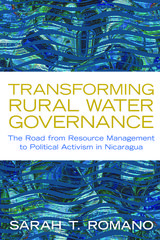
In Transforming Rural Water Governance Sarah T. Romano explains the bottom-up development and political impact of community-based water and sanitation committees (CAPS) in Nicaragua. Romano traces the evolution of CAPS from rural resource management associations into a national political force through grassroots organizing and strategic alliances.
Resource management and service provision is inherently political: charging residents fees for service, determining rules for household water shutoffs and reconnections, and negotiating access to water sources with local property owners constitute just a few of the highly political endeavors resource management associations like CAPS undertake as part of their day-to-day work in their communities. Yet, for decades in Nicaragua, this local work did not reflect political activism. In the mid-2000s CAPS’ collective push for social change propelled them onto a national stage and into new roles as they demanded recognition from the government.
Romano argues that the transformation of Nicaragua’s CAPS into political actors is a promising example of the pursuit of sustainable and equitable water governance, particularly in Latin America. Transforming Rural Water Governance demonstrates that when activism informs public policy processes, the outcome is more inclusive governance and the potential for greater social and environmental justice.
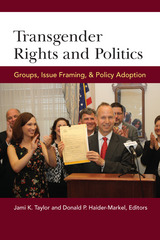

In recent years, celebrities from George Clooney to Bono to Angelina Jolie have attempted to play an increasingly important role in global politics. Celebrity activism is an ever-growing, internationally visible phenomenon—yet the impact of these high-profile humanitarians on public awareness, government support, and mobilization of resources remains under-researched. Bringing together a diverse group of contributors from media studies and public diplomacy, Transnational Celebrity Activism in Global Politics aims to fill that void with a new interdisciplinary framework for the analysis of celebrity activism in international relations.
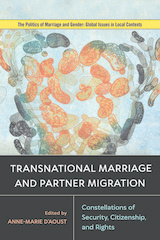
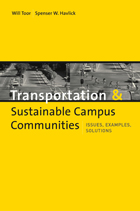
Colleges and universities across North America are facing difficult questions about automobile use and transportation. Lack of land for new parking lots and the desire to preserve air quality are but a few of the factors leading institutions toward a new vision based upon expanded transit access, better bicycle and pedestrian facilities, and incentives that encourage less driving.
Transportation and Sustainable Campus Communities presents a comprehensive examination of techniques available to manage transportation in campus communities. Authors Will Toor and Spenser W. Havlick give readers the understanding they need to develop alternatives to single-occupancy vehicles, and sets forth a series of case studies that show how transportation demand management programs have worked in a variety of campus communities, ranging from small towns to large cities. The case studies in Transportation and Sustainable Campus Communities highlight what works and what doesn't, as well as describing the programmatic and financial aspects involved.
No other book has surveyed the topic and produced viable options for reducing the parking, pollution, land use, and traffic problems that are created by an over-reliance on automobiles by students, faculty, and staff. Transportation and Sustainable Campus Communities is a unique source of information and ideas for anyone concerned with transportation planning and related issues.
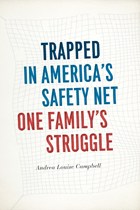
As a social policy scholar, Campbell thought she knew a lot about means-tested assistance programs. What she quickly learned was that missing from most government manuals and scholarly analyses was an understanding of how these programs actually affect the lives of the people who depend on them. Using Marcella and Dave’s situation as a case in point, she reveals their many shortcomings in Trapped in America’s Safety Net. Because American safety net programs are designed for the poor, Marcella and Dave first had to spend down their assets and drop their income to near-poverty level before qualifying for help. What’s more, to remain eligible, they will have to stay under these strictures for the rest of their lives, meaning they are barred from doing many of the things middle-class families are encouraged to do: Save for retirement. Develop an emergency fund. Take advantage of tax-free college savings. And, while Marcella and Dave’s story is tragic, the financial precariousness they endured even before the accident is all too common in America, where the prevalence of low-income work and unequal access to education have generated vast—and growing—economic inequality. The implementation of Obamacare has cut the number of uninsured and underinsured and reduced some of the disparities in coverage, but it continues to leave too many people open to tremendous risk.
Behind the statistics and beyond the ideological battles are human beings whose lives are stunted by policies that purport to help them. In showing how and why this happens, Trapped in America’s Safety Net offers a way to change it.
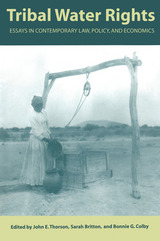
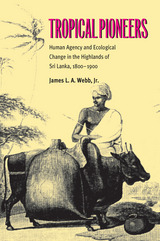
In 1800, the highlands of Sri Lanka had some of the most biologically diverse primary tropical rainforest ecosystems in the world. By 1900, only a few craggy corners and mountain caps had been spared the fire stick. Highland villagers, through the extension of slash-and-burn agriculture, and British managers, through the creation of plantations—first of coffee, then cinchona, and finally tea—had removed virtually the entire primary forest cover.
Tropical Pioneers documents the conversion of a tropical rainforest biome and the collision between what previously had been more discrete ecological zones within South Asia. The ecological impacts were transformational. Author James L. A. Webb, Jr., demonstrates that profound ecological disruption occurred in the central highlands of Sri Lanka during the nineteenth century and suggests that the theme of ecological crisis brought about by the integration of tropical ecological zones during precolonial and colonial periods alike is an important one for historians to investigate elsewhere.
Tropical Pioneers is based on extensive research in the National Archives of Sri Lanka, the National Agricultural Library at Gannaruwa, the Library of the Royal Asiatic Society-Ceylon Branch, the Royal Botanic Gardens at Kew, the Public Record Office of the United Kingdom, and the British Library.
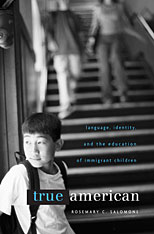
How can schools meet the needs of an increasingly diverse population of newcomers? Do bilingual programs help children transition into American life, or do they keep them in a linguistic ghetto? Are immigrants who maintain their native language uninterested in being American, or are they committed to changing what it means to be American?
In this ambitious book, Rosemary Salomone uses the heated debate over how best to educate immigrant children as a way to explore what national identity means in an age of globalization, transnationalism, and dual citizenship. She demolishes popular myths—that bilingualism impedes academic success, that English is under threat in contemporary America, that immigrants are reluctant to learn English, or that the ancestors of today’s assimilated Americans had all to gain and nothing to lose in abandoning their family language.
She lucidly reveals the little-known legislative history of bilingual education, its dizzying range of meanings in different schools, districts, and states, and the difficulty in proving or disproving whether it works—or defining it as a legal right.
In eye-opening comparisons, Salomone suggests that the simultaneous spread of English and the push toward multilingualism in western Europe offer economic and political advantages from which the U.S. could learn. She argues eloquently that multilingualism can and should be part of a meaningful education and responsible national citizenship in a globalized world.
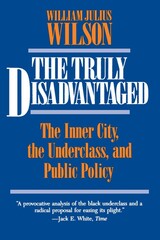
"'Must reading' for civil-rights leaders, leaders of advocacy organizations for the poor, and for elected officials in our major urban centers."—Bernard C. Watson, Journal of Negro Education
"Required reading for anyone, presidential candidate or private citizen, who really wants to address the growing plight of the black urban underclass."—David J. Garrow, Washington Post Book World
Selected by the editors of the New York Times Book Review as one of the sixteen best books of 1987.
Winner of the 1988 C. Wright Mills Award of the Society for the Study of Social Problems.
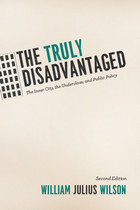
Renowned American sociologist William Julius Wilson takes a look at the social transformation of inner city ghettos, offering a sharp evaluation of the convergence of race and poverty. Rejecting both conservative and liberal interpretations of life in the inner city, Wilson offers essential information and a number of solutions to policymakers. The Truly Disadvantaged is a wide-ranging examination, looking at the relationship between race, employment, and education from the 1950s onwards, with surprising and provocative findings. This second edition also includes a new afterword from Wilson himself that brings the book up to date and offers fresh insight into its findings.
“The Truly Disadvantaged should spur critical thinking in many quarters about the causes and possible remedies for inner city poverty. As policymakers grapple with the problems of an enlarged underclass they—as well as community leaders and all concerned Americans of all races—would be advised to examine Mr. Wilson's incisive analysis.”—Robert Greenstein, New York Times Book Review
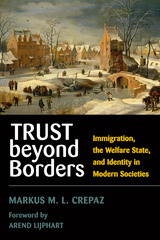
Will immigration undermine the welfare state? Trust beyond Borders draws on public opinion data and case studies of Germany, Sweden, and the United States to document the influence of immigration and diversity on trust, reciprocity, and public support for welfare programs. Markus M. L. Crepaz demonstrates that we are, at least in some cases, capable of trusting beyond borders: of expressing faith in our fellow humans and extending help without regard for political classifications.
In Europe, the welfare state developed under conditions of relative homogeneity that fostered high levels of trust among citizens, while in America anxiety about immigration and diversity predated the emergence of a social safety net. Looking at our new era of global migration, Crepaz traces the renewed debate about "us" versus "them" on both sides of the Atlantic and asks how it will affect the public commitment to social welfare. Drawing on the literatures on immigration, identity, social trust, and the welfare state, Trust beyond Borders presents a novel analysis of immigration's challenge to the welfare state and a persuasive exploration of the policies that may yet preserve it.
"Crepaz contributes much to our knowledge about the link between immigration and social welfare, certainly one of the central issues in current national and international politics."
---Stuart Soroka, Associate Professor of Political Science and William Dawson Scholar, McGill University
"Finally! A book that challenges the growing view that ethnic diversity is the enemy of social solidarity. It addresses an issue of intense debate in Western nations; it takes dead aim at the theoretical issues at the center of the controversy; it deploys an impressive array of empirical evidence; and its conclusions represent a powerful corrective to the current drift of opinion. Trust beyond Borders will rank among the very best books in the field."
---Keith Banting, Queen's Research Chair in Public Policy, Queen's University
"Do mass immigration and ethnic diversity threaten popular support for the welfare state? Trust beyond Borders answers no. Marshaling an impressive array of comparative opinion data, Crepaz shows that countries with high levels of social trust and universal welfare state arrangements can avoid the development of the welfare chauvinism that typically accompanies diversity."
---Gary Freeman, Professor and Department Chair, Department of Government, University of Texas at Austin
Markus M. L. Crepaz is Professor in the Department of International Affairs at the University of Georgia and Associate Director of the Center for the Study of Global Issues (GLOBIS).

Trust in Public Life is a collection of essays addressing the importance of trust in public life and how public servants can engender and sustain it. In “The Roots of Trust,” Anna Rowlands argues that our loss of trust is a feature of modernity that can only be solved through encounters with real people. In “Trust in Oneself,” Claire Gilbert makes the case that leaders need to have self-trust and confidence to rule. In “Trust in Institutions,” Anthony Ball offers a guide to rebuilding trust in institutions through four virtues: honesty, humility, compassion, and competence. Finally, in “Trust in People,” James Hawkey argues that trust between groups is a choice, not something that can be injected like a vaccine. Together, the essays offer valuable reflections on trust in public life, agreeing that it must be engendered, and offer guidance on how this might be achieved.

This timely book traces the development of banking and paper money in republican Tianjin in order to explore the creation of social trust in financial institutions. Framing the study around Bian Baimei, a conscientious branch manager of the Bank of China, Brett Sheehan analyzes the actions of bankers, officials, and local elites as they tried to overcome political and financial crises and instill trust in the banking system.
After early failures in promoting trust, government authority as a regulator of the financial system gradually increased, peaking in 1935, when the state unified the money supply for the first time in several hundred years. Concurrently, when local elites proved unable to develop successful strategies to make people trust the system, their influence declined. The need for trust in increasingly complex financial arrangements redefined state-society relations, simultaneously enhancing state power and creating new constraints on the actions of both elites and governments.
Trust in Troubled Times is a valuable new perspective on the economic, social, and political history of modern China.
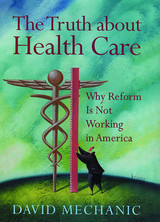
In The Truth about Health Care, David Mechanic explains how health care in America has evolved in ways that favor a myriad of economic, professional, and political interests over those of patients. While money has always had a place in medical care, "big money" and the quest for profits has become dominant, making meaningful reforms difficult to achieve. Mechanic acknowledges that railing against these influences, which are here to stay, can achieve only so much. Instead, he asks whether it is possible to convert what is best about health care in America into a well functioning system that better serves the entire population.
Bringing decades of experience as an active health policy participant, researcher, teacher, and consultant to the public and private sectors, Mechanic examines the strengths and weaknesses of our system and how it has evolved. He pays special attention to areas often neglected in policy discussions, such as the loss of public trust in medicine, the tragic state of long-term care, and the relationship of mental health to health care.
For anyone who has been frustrated by uncoordinated health networks, insurance denials, and other obstacles to obtaining appropriate care, this book will provide a refreshing and frank look at the system's current and future dilemmas. Mechanic's thoughtful roadmap describes how health plans, healthcare professionals, policymakers, and consumer groups can work together to improve access, quality, fairness, and health outcomes in America.
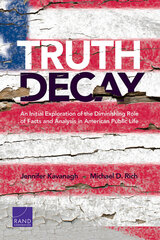

Turkey Reframed documents the first decade of the 2000s, a period of radical change in Turkish society and politics, which has been marked by the major economic crisis of 2001 and the coming to power of ex-Islamist cadres organised under the Justice and Development Party (AKP).
The contributors analyse this period of radical change, with its continuities and breaks, and its main actor, the AKP, in relation to the creation of a neoliberal hegemony in post-1980 Turkey. They look at the conflictual, turbulent and painful history of neoliberal hegemony and the contested stabilisation strategy of the AKP government.
Turkey Reframed is a cutting-edge guide for students, scholars and other interested readers who want to understand this period in Turkey’s recent history and its social tensions.

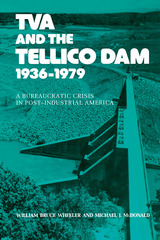

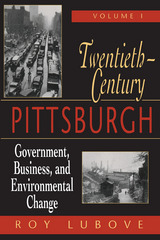
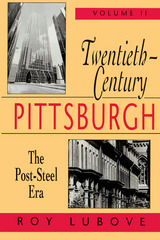
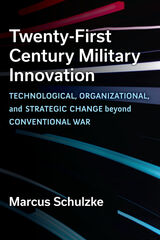
Contemporary war is as much a quest for decisive technological, organizational, and doctrinal superiority before the fighting starts as it is an effort to destroy enemy militaries during battle. Armed forces that are not actively fighting are instead actively reengineering themselves for success in the next fight and imagining what that next fight may look like. Twenty-First Century Military Innovation outlines the most theoretically important themes in contemporary warfare, especially as these appear in distinctive innovations that signal changes in states’ warfighting capacities and their political goals.
Marcus Schulzke examines eight case studies that illustrate the overall direction of military innovation and important underlying themes. He devotes three chapters to new weapons technologies (drones, cyberweapons, and nonlethal weapons), two chapters to changes in the composition of state military forces (private military contractors and special operations forces), and three chapters to strategic and tactical changes (targeted killing, population-centric counterinsurgency, and degradation). Each case study includes an accessible introduction to the topic area, an overview of the ongoing scholarly debates surrounding that topic, and the most important theoretical implications. An engaging overview of the themes that emerge with military innovation, this book will also attract readers interested in particular topic areas.
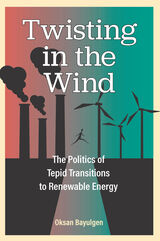
Why do governments insist on fossil fuels? Why do renewables face uncertain and inconsistent legal and regulatory circumstances that slow their market-share growth against fossil fuels? Oksan Bayulgen studies the political determinants of partial energy reforms that result in tepid energy transitions and shifts the geographical focus from front-runner countries of energy innovation to developing countries, which have become the largest carbon emitters in the world. Her in-depth case study of energy policies in Turkey over the past two decades demonstrates that energy transitions are neither inevitable nor linear and that they are often initiated if and only when promoting renewables is in the interests of governing elites and stall when political dividends associated with energy rents change. This book contributes to the debates on the nature and pace of energy transitions by analyzing the power dynamics and political institutions under which energy reforms are initiated and implemented over time. This timely topic will be of interest to scholars, policymakers, energy investors, and anyone interested in environmental studies.
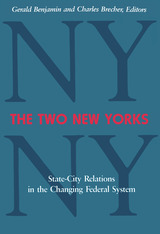
READERS
Browse our collection.
PUBLISHERS
See BiblioVault's publisher services.
STUDENT SERVICES
Files for college accessibility offices.
UChicago Accessibility Resources
home | accessibility | search | about | contact us
BiblioVault ® 2001 - 2024
The University of Chicago Press








